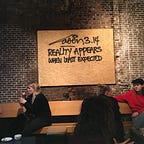Beware
The clouds are my clocks. — Mopati Morake
Mo meant that after a few weeks of quarantine he stopped looking at his watch or his phone. Is it Tuesday or Wednesday? We’re all feeling time bleed together.
Together, for the first time in history, we all feel time bleed.
No one is going to forget the before and after of Corona, the world we knew and now this other. Even the clouds will speak of it.
For me, day one was March 15th, the Ides.
That was the day the problem took grip of my town, went from a headline about China or Italy to a reality here, in Amsterdam. Cafes closed. Panic buying in the markets. Corona. Virus. What now? Everywhere and anywhere this was what, in his most important line, Hamlet called the “the buzz-buzz.”
Yet a kind of pause too, a deep breath. Everyone was so busy just a week before, just as they had been the month before that and the whole year previous. Before Corona we lived super-charged lives always after something. And in that first week, now too, there is nothing to do but connect, to call friends and ask, “Are you afraid?” What is it like there?”
My inbox includes emails from companies and agencies, organizations and institutions announcing plans and responses, how they are shutting down and moving on line, concern comes with seeing “extraordinary resilience within our community.”
Cool. We are gonna need it.
A few years after it was over, Londoners who lived through the blitz of World War II felt nostalgia for that terrifying time. Despite the danger — because of it — they connected to one another. A common enemy lent itself to a truer sense of community. None would have chosen to return to when bombs fell from the sky, but the worse it got, the more they came together.
Pandemics, regrettably, work differently. People start brave but soon see each other as a threat. Our challenge remains ahead of us. We cannot yet see the end of the beginning, let alone the beginning of the end.
Whatever we learn from all this it will not be worth the suffering and pain. In the tech hubs and the start-up economy we were told to persevere, to keep going through failure, get out of our comfort zone, and work with a growth mindset. Do that and you end up with a mansion on a hill.
Now what will be demanded of us, at least in the immediate, is less perseverance, and more endurance. Suddenly the homeless guy knows more than the mansion dweller.
Corona looks to spare many it infects. That’s good. And yes, we do have the internet, and if we can Zoom and Skype and Facetime our way into not seeing each other as a threat, as is the typical pattern of epidemic, maintaining a touch of community and a shred of sanity, that would be a boon and we can send Silicon Valley a gold star.
But that will hardly confirm the value of tech, make up for the mirage foisted on us by its titans. If you know the streets of San Francisco and the homeless population living there, you know “connectivity” was a marketing campaign, a way to build mansions.
(Somewhere I read justice anywhere threatens justice everywhere.)
“If the best thing we do is look after each other,” Adam Phillips writes, “then the worst thing we do is pretend to look after each other when in fact we are doing something else.”
Rather than for liking likes and trolling trolls and dispersing pornography, we could see the internet as a second wheel of everything, the tool we need to dial up a well-woven global village.
In our village now, no marketing campaign can co-opt, no greed suppress and no flim-flammer deny the ancient lesson we hear shouting at us from every screen, whispered in our every ear: We are all connected, we are all connected.
Beware thinking otherwise.
Wash up, hunker down, and take care.
–Ted
